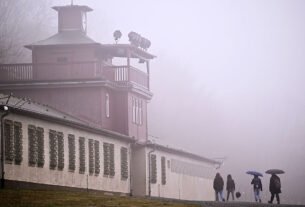Having tried to appear constructive and responsible in recent months, French far-right leader Marine Le Pen is now betting on a confrontational strategy designed to force early elections and put her on a path back to power.
The turning point came in late August, when Le Pen quickly vowed not to support the 8 September confidence vote in Prime Minister François Bayrou.
For months, the leader of the National Rally (RN) had ostentatiously refused to back left-wing no-confidence motions, cultivating the image of a responsible opponent who would not bring down the government and plunge France into chaos. Bayrou even convinced himself he could count on her party’s tactical abstention before pitching a no-confidence vote last week. But he was wrong.
The RN has moved away from efforts to look statesmanlike an.
The result? Any new government after Bayrou’s predictable fall risks being toppled by a no-confidence vote with the support of the far-right group, which counts 123 deputies in the lower house.
The goal? Suffocate the executive, force a dissolution and pave the way to government.
The far right has reasons to feel confident. RN is polling at around 33%, strengthening its belief that fresh elections would deliver more seats.
“We are not asking to storm the Bastille,” Thierry Mariani, an RN MEP, told Euractiv. “We are saying that voters should be asked for their opinion because there is no majority. When the situation is blocked, asking for a vote is simply called democracy.”
2027 in sight
Le Pen is appealing a March conviction for embezzlement in a case involving parliamentary assistants. For now, she is technically barred from running for office for five years, meaning that without institutional leverage, her path to the presidency in 2027 is blocked.
For supporters of President Emmanuel Macron, this explains much of the RN’s new approach. Three senior officials from Macron’s camp, who spoke on condition of anonymity, said that by aiming for fresh elections designed to install a RN prime minister – likely party president Jordan Bardella – Le Pen could place her camp inside the state apparatus. From there, they said, she could pursue an amnesty law that could erase her judicial obstacles and clear the way for a presidential run.
For now, should fresh parliamentary elections be called, Le Pen is technically barred from standing again for her seat in the National Assembly.
RN spokesperson Laurent Jacobelli said Le Pen would “fight, with all the legal means at our disposal, to stand as a candidate”.
In reality, her supporters are confident that the country’s top constitutional court would not step in to bar her from running – especially given her party’s healthy support.
Mariani, the far right MEP, dismissed the idea of aiming for an amnesty law as “ridiculous”.
Internal risk
The RN’s change of tactic carries risks, however. It may be seen as crossing a line on respect for institutional order. And not everyone in the party is at ease with the new direction.
The rising star, Bardella, for instance, seems more keen to preserve the “responsible” image that has fueled his rise.
After a joint meeting with Bayrou, Le Pen pushed for an immediate “ultra-fast” dissolution, while Bardella was more cautious, stressing that elections were required mainly to secure a budget for 2026.
“She has a taste for blood, but the French don’t like disorder,” noted a Macron adviser.
Bardella also repeatedly tried to reassure France’s economic establishment this week, appearing in front of the top employer’s federation and issuing an open letter pledging stability.
Erwan Lecoeur, a sociologist at Grenoble East University who has worked on the far right, sees an increasingly sharp divide within the RN between the line taken by Bardella, “who believes the right must engage with big business”, and the more populist stance of Marine Le Pen.
“But she alone makes the decisions,” Lecoeur added.
Others downplay the difference. “There is no real policy gap between Bardella and Le Pen,” RN MP Philippe Ballard told Euractiv, pointing out that the two met Bayrou together and spoke “with one voice.”
Reviving a republican front
Plus, there’s another obstacle in using institutional paralysis to try and force Macron’s hand, turn a relative majority into a springboard for 2027 and break through Le Pen’s judicial ceiling: It may revive the forces determined to block the far right from power.
“What unites the left, the center, and part of the right is avoiding Bardella in Matignon and Le Pen in the Élysée,” said one longtime presidential adviser.
Macron recently urged coalition partners to engage with socialists but avoid both extremes. And so far, socialist leader Olivier Faure is answering the call.
Le Pen’s gamble in response is that public anger, against Macron in particular, remains raw and can be channeled. “She wants to exploit the almost pre-insurrectionary climate she sees in the country,” Lecoeur added.
And she received an unexpected but significant boost from former centre-right President Nicolas Sarkozy this week. In an interview with conservative newspaper Le Figaro, Sarkozy said he “sees no other solution than dissolution” and argued that the RN could win “at least a relative majority”, which he described as preferable to the current deadlock.
(vc)





